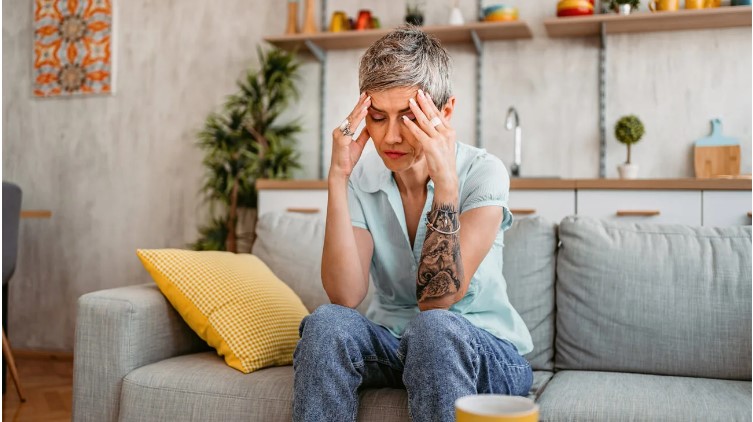
Researchers indicate that migraine symptoms often intensify during menopause but generally diminish afterward. They also note that migraines can affect sleep quality at any age. According to experts, various medications can alleviate migraine symptoms, and lifestyle changes can enhance sleep quality.
A new study shows that the transition to menopause can exacerbate migraine symptoms, particularly in women with a history of migraines related to hormonal fluctuations during their menstrual cycles. For these women, headaches typically diminish after menopause, except for those undergoing hormone replacement therapy.
The research team examined the relationship between migraines and sleep quality in premenopausal women, comparing the findings to those of perimenopausal women. They analyzed data from over 2,000 female participants and will present their results at the North American Menopause Society annual meeting this week.
However, these findings have not yet been published in a peer-reviewed journal.
Sleep and Migraine
The researchers highlighted that their study reaffirms the existing link between poor sleep and migraine occurrences.
For women who have not yet undergone menopause, poor sleep appeared to be a trigger for migraines. However, this correlation does not necessarily hold true for both premenopausal and perimenopausal women.
In premenopausal women, factors such as body mass index, anxiety, depression, and hot flashes were more likely to contribute to poor sleep quality but were not identified as migraine triggers, according to the researchers.
“Clinical observations, supported by studies, suggest that migraines generally worsen during the menopause transition and improve post-menopause,” said Dr. Medhat Mikhael, a pain management specialist and medical director of the non-operative program at the Spine Health Center at MemorialCare Orange Coast Medical Center in California.
“A perimenopause-related increase in comorbid conditions like anxiety, depression, and sleep disturbances can also exacerbate migraines,” he told Healthline.
Previous studies have not demonstrated an association between migraines and sleep apnea.
“However, individuals with sleep apnea can experience morning headaches caused by nighttime hypoxia (low oxygen levels) due to sleep apnea,” explained Dr. Alex Dimitriu, an expert in psychiatry and sleep medicine and the founder of Menlo Park Psychiatry & Sleep Medicine in California and BrainfoodMD.
“These morning headaches should be distinguished from migraine headaches,” he told Healthline.
What to Know About Migraine
Migraine is a neurological disease that affects millions. According to the American Migraine Foundation, at least 39 million people in the United States experience migraines.
The symptoms can vary from person to person, but commonly include:
- Throbbing, pounding, or pulsating head pain
- Pain that worsens with physical activity or any movement
- Nausea or vomiting accompanying the pain
- Sensitivity to light, sounds, and smells
- Headaches lasting from several hours to several days
- Pain localized on one side of the head, as well as in the front or back of the head
A report published in 2020 indicates that women are more frequently affected by migraines and experience a higher level of disability than men. Approximately 43 percent of women will experience migraines at some point in their lives, compared to 18 percent of men.
Hormonal fluctuations, particularly involving estrogen, can trigger more frequent and severe migraines in women. These triggers often occur shortly before or during the menstrual cycle, after childbirth, and during the menopausal transition.
Treatments and Therapies for Migraines
Migraine is a genetic neurological disease, according to the American Migraine Foundation. While triggers like stress, certain foods, or poor sleep may make you more susceptible to headaches, they are not the underlying causes of migraines.
“Perimenopause often poses challenges in treating migraines due to the unpredictability of hormone-related attacks and frequent worsening of symptoms. Fluctuating estrogen levels during perimenopause can increase the frequency of hormone headaches,” said Dr. Shae Datta, co-director of NYU Langone’s Concussion Center and director of cognitive neurology at NYU Langone Hospital-Long Island.
“Specific SNRIs [drugs] can be used to target vasomotor symptoms and sleep disruptions that occur during menopause and simultaneously treat migraine severity and intensity,” she told Healthline.
In addition to medication, certain lifestyle changes may help reduce the frequency and intensity of headaches. Dr. Dimitriu recommends the following lifestyle modifications:
- Maintain Regular Sleep Patterns: Go to sleep and wake up at the same time each day. Maintain sleep hygiene by instituting routines that promote rest and making your bedroom comfortable and free of disruptions. If you nap, keep it short and limit naps to the early afternoon.
- Exercise Regularly: Engage in aerobic exercises, walking, stretching, and swimming to reduce stress and anxiety, which can, in turn, make sleeping easier at night.
- Eat Regular Meals: Do not skip meals. Eat a nutritious breakfast and avoid high-carb foods. Limit eating to light snacks in the hours leading up to bedtime. A big, heavy, or spicy meal late in the day can interfere with your sleep.
- Reduce Stress: In addition to regular exercise, use stress-reduction techniques like yoga, meditation, and deep breathing exercises.
- Avoid Known Triggers: Stay away from certain foods, wines, cheeses, and other substances that are known to trigger migraines.
Although good sleep hygiene may not eliminate headaches, it can help reduce their frequency and intensity, according to experts.
Good sleep hygiene varies from person to person. To find what works best for you, experiment with different sleep adjustments and start with minor changes.
If adjustments in sleep hygiene don’t provide relief, it might be beneficial to consult a sleep specialist. Issues like frequent insomnia, sleep apnea, and other sleep disorders may require treatment. Although there isn’t a definitive link between sleep apnea and migraines, sleep deprivation can trigger migraines. Regular, adequate sleep leads to fewer headaches, as stated by the American Migraine Foundation.
“Women should also be advised to keep a headache diary. Both preventative and acute treatment options should be considered based on the frequency and burden of headaches,” added Dr. Datta. “Treatment of other comorbidities like BMI, hypertension, mood issues, and sleep quality should guide the choice of medications.”
